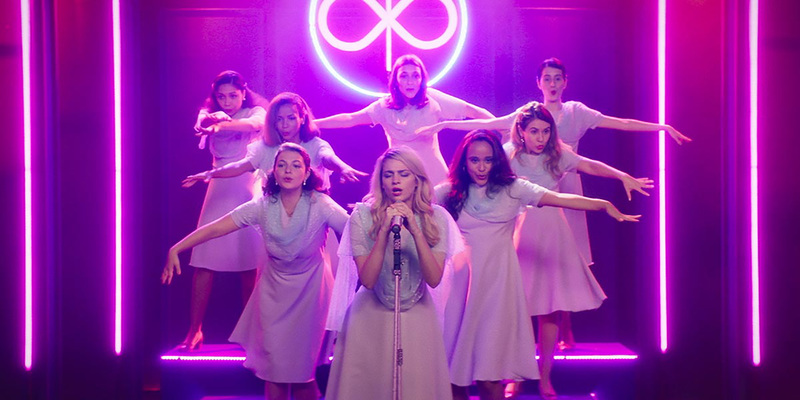
Review by
Benjamin Poole
Directed by: Anita Rocha da Silveira
Starring: Mari Oliveira, Lara Tremouroux, Arthur Santileone, Felipe Frazao, Bruna
Linzmeyer, Thiago Fragoso

The other day I was chatting to someone whose MA compared Islamic and
Christian eschatology. As you can imagine, being a fascinated outsider I
had a billion questions, and over the ensuing conversation they patiently
explained that there was a great deal of narrative overlap between the
three Abrahamic religions, with points of divergence occurring due to
slightly different interpretations of similar events: elucidations which
calcified into the doctrines which have defined the major creeds for
ensuing millennia. To me, a respectful interloper, it seems that the
belief systems which people build their understanding of the world around,
and in some cases their identity, are fundamentally analogous. And further
to this, a person's faith, the camp they fall into, may ultimately be
tribal; an ideology perhaps defined in opposition to ostensibly separate
classification, with the believer compelled by a human desire to be a part
of something which has meaning bigger than the self. It's a similar
dynamic to supporting a particular football team, or, in the case of
Medusa, Brazilian filmmaker Anita Rocha da Silveira's at times startling
sophomore feature, being part of a teenage gang: a need to belong, which,
if desperate enough, overrides all logic and individual reason.

In what could be the most adrenalised opening of the year, an androgynous
dancer contorts against a pitch-black background, their impressive body
twisted into an upside-down crawl (you know, like Regan going down the
stairs) which they appealingly wrench to some intense night music, all the
while lit by the stop/start tease of strobing red and green lights. Before
you can say, "Oi Gasper (Noé), wake up you're having that dream again," we
pull out to reveal a pair of black lacquered hands holding an iPhone
screen wherein the action plays out, and a female face watching with
suitable erotic wonder. Cut to night-time, Brasília: a wide angle takes in
the blue shadowed depths of the back street where our dance dazed heroine
leaves her bus to walk home alone. Except, not for long, as filling the
background behind her is an eight strong gang, distinguished by the blank
white Les yeux sans visage masks they all wear. They kick
our girl to the kerb, screaming that she is a "filthy slut" and "a
pervert" while they punch and boot her. As the gang terrorises the kid we
notice their long hair, willowy frames and treble voices: they're girls
themselves.
Medusa's tricksy, exciting opening trains us to consider what comes next with a
Brechtian eye, foregrounding its cultural themes and rhetoric. Concerned
with female-on-female violence and the rising wave of active conservatism
in Brazil, Rocha da Silveira's film is a serious satire of where the
filmmaker sees Brazil heading, and which confronts its audience with vivid
and sensual imagery to make its point.
A key member of the gang is Mariana (Mari Oliveira), who spends her
evenings stomping girls who her crew see as impure and imploring them to
make video confessions converting to Christianity, and her days practising
in a choir for a church which sanctions both activities. Their pastor (Thiago Fragoso) is an evangelical who is running for political office: "When He
descends from heaven/ The whole universe will quake," the choir intone to
a mini-pops beat, wall to wall smiles beaming beatifically. It is the
campest thing you've ever seen, and a high comedy contrast to the cruelty
of a few scenes earlier. As inspired by the nightmare rhythms of giallo,
nothing is subtle in Medusa.

Mariana is the dead spit of British actor Zawe Ashton - i.e., utterly
gorgeous, which makes a justified retaliation from a would-be victim
wherein Mariana gets her cheek cut open all the more poignant. Except not
really: it's only a scar, but it doesn't coincide with the fascistic
values of Mariana's contexts. Girls should be "beautiful, demure and at
home," according to the church credo, and Mariana's so-perceived
disfigurement means she can't be a receptionist at a Cosmetic Surgery
anymore, a business where "looks are everything" (I did say that it was
blunt). Mariana's boss chastises that a "worthy woman doesn't walk alone
at night" and the disgraced gang member is forced to work as a nurse in a
hospice, where an almost mythically revered patient resides: a hideously
scarred casualty of the sort of carnage Mariana gleefully enacted.
Medusa follows an A Clockwork Orange arc,
wherein the stylised violence its anti-hero doles out in opening sequences
are juxtaposed by the humble pie of the middle act. The problem with
Medusa, however, is that during the ensuing plot it never quite recaptures or
even capitalises on the kinetic potential of its opening. We understand
its outlook within the first 20 minutes, and then it's a case of
experiencing two hours or so of variations upon the theme. As Mariana
inevitably falls in love with a male nurse, has tentative intimacies with
a female colleague, and generally begins to realise that she's been an
arsehole for x amount of years, the film is always watchable due to
João Atala's gleaming cinematography and Rocha da Silveira's lively
sense of humour. But if only the knife which assailed Mariana could have
also slipped and lopped off some of the running time: less would be more
to facilitate Medusa's mean and keen pop impact wherein Rocha da Silveira makes salient
points about Brazil's socio-political situation.

The recent news that the political future of (sure inspiration for
Medusa's antagonism) Jair Bolsonaro has been apparently halted following an
electoral ban provides welcome succour to Rocha da Silveira's
disparagement of the forces which play upon insecurity and weaponise
religion in order to foster hatred and sow tribal division. Duly,
Medusa ends in existential crisis, with the reassuring prior
promises of belonging and salvation ultimately proving to be as hollow and
hopeless as a scream into the void.

Medusa is in UK/ROI cinemas and on
VOD from July 14th.

